Can Apple save us from ourselves?
Yes, we're addicted to our smartphones. But is that really Apple's fault?


A free daily email with the biggest news stories of the day – and the best features from TheWeek.com
You are now subscribed
Your newsletter sign-up was successful
We have a smartphone addiction problem. Around 77 percent of American adults now own a smartphone, up from 35 percent in 2011, and many of those users check their phones at least 80 times a day. "Nomophobia" — the fear associated with loss of mobile contact — impacts a substantial share of smartphone users, according to recent surveys.
But as bad as adult addiction to the smartphone may be, the problem is significantly worse in young people. The average age for smartphone acquisition is now 10 years old — and as smartphone users grow younger and more impressionable, the consequences of smartphone addiction are only growing.
In response to this trend, two major Apple shareholders — California's teacher pension fund, CalSTRS, and the JANA Partners investment group — are asking Apple to build child and teen parameters into their products. In an open letter to the company's board, they argue that it doesn't make sense to hand a child or teen "the same phone as a 40-year-old":
The Week
Escape your echo chamber. Get the facts behind the news, plus analysis from multiple perspectives.

Sign up for The Week's Free Newsletters
From our morning news briefing to a weekly Good News Newsletter, get the best of The Week delivered directly to your inbox.
From our morning news briefing to a weekly Good News Newsletter, get the best of The Week delivered directly to your inbox.
The average American teenager who uses a smart phone receives her first phone at age 10 and spends over 4.5 hours a day on it (excluding texting and talking). 78% of teens check their phones at least hourly and 50% report feeling ‘addicted' to their phones. It would defy common sense to argue that this level of usage, by children whose brains are still developing, is not having at least some impact, or that the maker of such a powerful product has no role to play in helping parents to ensure it is being used optimally. [JANA Partners]
Of course, such involvement and concern on Apple's part would be ideal. In a perfect world, Apple (as well as other tech giants like Facebook and Google) would take responsibility for the dangerously addictive nature of their technologies. But is this a case in which we can demand higher standards from industry giants like Apple? Can we effectively ask them to save us from ourselves? Or is this akin to demanding that McDonald's only offer free-range, organic chicken tenders in their kid's meals?
Too often, smartphone users forget that the virtual world presented to them via their devices is brand new and relatively unknown territory; most of us grew up without these devices in our homes. The "iGen" generation (thus named by Jean Twenge in her new book on young people and technology) is the first group to grow up with such technology. And now that we're seeing the impact it is having on their emotional, intellectual, and physical lives, we must adjust our habits and practices accordingly. We should be as wary of technology's dangers as we are cognizant of its many gifts.
Ironically, many Silicon Valley executives seem to understand the potential dangers better than the rest of us. Steve Jobs did not let his children use the iPad, and told New York Times journalist Nick Bilton in 2010 that he limited the technology his kids used at home. Evan Williams, founder of Twitter and Medium, refused to give his sons an iPad. In his new book Irresistible, professor and author Adam Alter muses, "It seemed as if the people producing tech products were following the cardinal rule of drug dealing: Never get high on your own supply."
But of course, tech giants don't usually share this wariness with the rest of us. The Apple Store sells a myriad of apps designed for toddlers and babies; wearable devices like the Apple Watch encourage us to be constantly plugged in. While televisions are now often outfitted with parental controls, we have yet to see similar capabilities built into our mobile devices. Asking Apple to help wean children and young adults off their products — or, better yet, to prevent them from getting addicted to smartphones in the first place — is somewhat like asking Chick-fil-a to make their fries less delicious, so customers will buy them less often. It doesn't seem like good business sense — unless, perhaps, Apple considers the long-term benefits of cultivating the trust and loyalty of present and future parental consumers.
A free daily email with the biggest news stories of the day – and the best features from TheWeek.com
The tension between a company's larger standards and ethical considerations, and their ability to profit via our addiction and insatiability, will always be in conflict. The best companies are aware of this tension, and strive to consider more than profit in establishing their goals and aspirations. But no business will ever serve as our guardian angel, demanding more of us than we ask of ourselves. For that reason, while we should demand higher standards and conscientiousness from prominent tech companies, we must look to our own homes to fight the pervasive influence of smartphones and their ilk.
Sherry Turkle offers many ideas for fighting technological obsession in her book Reclaiming Conversation, as does Alter in Irresistible. Both authors recommend carving out and delineating physical spaces — Turkle calls them "sacred spaces" — in which smart devices are set aside. Turkle's research indicates that the mere presence of a smartphone can subconsciously deter conversation and connection — thus leading her to suggest that we hide away (or leave behind) our mobile devices when sitting in the classroom, at the dinner table, or at coffee with a friend.
Measures like these are not just for our own benefit — they also help influence and encourage those around us. The iGen generation that Twenge writes about, that Apple's investors are worried about, need the hands-on influence and mentorship of parents, teachers, and peers to overcome entrenched habits and foster new daily rhythms. Apple may be able to help, if it's willing. But ultimately, we're the ones who must be held accountable.
Gracy Olmstead is a writer and journalist located outside Washington, D.C. She's written for The American Conservative, National Review, The Federalist, and The Washington Times, among others.
-
 The problem with diagnosing profound autism
The problem with diagnosing profound autismThe Explainer Experts are reconsidering the idea of autism as a spectrum, which could impact diagnoses and policy making for the condition
-
 What to know before filing your own taxes for the first time
What to know before filing your own taxes for the first timethe explainer Tackle this financial milestone with confidence
-
 The biggest box office flops of the 21st century
The biggest box office flops of the 21st centuryin depth Unnecessary remakes and turgid, expensive CGI-fests highlight this list of these most notorious box-office losers
-
 Do unvaccinated COVID patients deserve scarce care? A doctor weighs in.
Do unvaccinated COVID patients deserve scarce care? A doctor weighs in.The Explainer Justice, judgment, and the last ICU bed
-
 How to vaccinate the anti-vaxxers
How to vaccinate the anti-vaxxersThe Explainer Instead of blaming people for not doing the right thing, let's focus on eliminating the obstacles to vaccination that still remain
-
 The U.S. could double its COVID-19 vaccine availability overnight. What's the holdup?
The U.S. could double its COVID-19 vaccine availability overnight. What's the holdup?The Explainer How the FDA could approve a more efficient vaccine rollout
-
 The October Surprise nobody wanted
The October Surprise nobody wantedThe Explainer Trump has COVID-19. Really, 2020?
-
 Life is worth living
Life is worth livingThe Explainer What's driving America's rising suicide rate?
-
 Social workers are masters at de-escalation. Here's what the police can learn from them.
Social workers are masters at de-escalation. Here's what the police can learn from them.The Explainer Knowing how to peacefully resolve conflict, rather than exacerbate it, can save lives
-
 Settling in for the long pandemic
Settling in for the long pandemicThe Explainer Life won't be back to "normal" anytime soon
-
 Sports reveal how much America is trailing the rest of the world
Sports reveal how much America is trailing the rest of the worldThe Explainer MLS and other American leagues are stumbling through their pandemic restart plans
